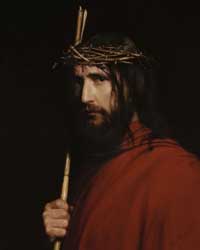
THE JOURNEY letters section continues to have lively discussion in response to our February edition Who is Jesus? and the review of Who on Earth was Jesus? a book by Quaker and humanist author David Boulton. Mr Boulton was in Australia in September to speak at the SoFiA conference in Toowoomba.
Journey spoke with Mr Boulton as well as Centenary Uniting Church (Brisbane) minister and National Working Group on Worship chair Rev Dr Paul Walton and former moderator Rev Don Whebell to find out who, on earth, is Jesus and does it matter?
The Basis of Union, the foundation document of the Uniting Church, speaks of Jesus of Nazareth, “Who announced the sovereign grace of God whereby the poor in spirit could receive God’s love, Jesus himself, in his life and death, made the response of humility, obedience and trust which God had long sought in vain.” (Paragraph three)
“There’s a lot in this,” said Dr Walton. “Jesus announced good news to the poor and lived a life fully and uniquely open to God.
“But the Basis goes further: ‘In raising him to live and reign, God confirmed and completed the witness which Jesus bore to God on earth, reasserted claim over the whole of creation, pardoned sinners, and made in Jesus a representative beginning of a new order of righteousness and love’. ”
Mr Whebell said the most we can know about God is “what he has shown of himself in the life, death and resurrection of Jesus Christ”.
Dr Walton said it was important to attempt to understand more about Jesus.
“If nothing else, Jesus is the figure that haunts and inhabits our culture, often unseen, like the third figure who walked the road to Emmaus (Luke 24),” he said.
“He has inspired millions to lives of service. And we are convinced he lives.
“But the bible doesn’t give us a psychological profile of Jesus. People simply weren’t interested in that kind of thing. We don’t and can’t understand the person he was, except indirectly and provisionally through the affects he had on peoples’ lives.”
Mr Boulton said by the end of the first century, when the gospels were written, Jesus had already been “mythologised, theologised, and re-invented by the church".
“The Christ of faith is a theological construction.”
Dr Walton agreed, but said there was no shame in that.
“The Jesus the gospels give us is already theologically constructed, so we shouldn’t be apologetic about a theological construct.”
When searching for a historical Jesus it is possible that we construct what we find to match our own beliefs and values. Dr Walton, Mr Whebell and Mr Boulton all had issues with this concept.
“If we find a Jesus that suits us, we’ve found the wrong Jesus,” said Mr Boulton. “A Jesus who doesn’t challenge us is of no earthly use.”
Dr Walton said those who try to construct the historical Jesus usually end up with a Jesus who is very like them.
“Of course, we need to connect to Jesus on a personal level,” he said.
“I am sure that the grace of God allows us to know Jesus in real, though incomplete and even inaccurate ways, as part of our spiritual growth and journey.
“Mind you, we need to keep questioning our grasp of Jesus – and his grasp of us.”
So during the search for Jesus we may find many different answers but Jesus’ key messages about justice and caring for each other shine through all interpretations.
“We need to tell the story of Jesus – we know he transforms lives!” said Dr Walton.
“We should lead in justice and peace-making, receive the stranger with hospitality, be open to God’s spirit working in and through unexpected people, including those whose basic sexuality may trouble us, challenge the disregard of the environment and the abuse of the weak, including children.”
Mr Whebell agreed.
“Jesus summed it up pretty well when asked about which was the greatest commandment: ‘Love God with all your heart, soul, mind and strength – and love your neighbour as you love yourself’,” he said.
Mr Boulton said Jesus’ key message was, and is, “Let us try what love will do”.
“So simple … so hard!” he said. “But if we dared to live that way we’d begin to transform the world.
“That Jesus was a trouble-maker, a rebel and a subversive, and that if we are to call ourselves followers of Jesus we must find the courage to be trouble-makers, rebels and subversives. Of such is the kingdom of heaven,” said Mr Boulton.
Photo : Carl Heinrich Bloch (Danish painter, 1834-90), Christ with Thorns, oil on canvas. Courtesy of www.carlbloch.com
 JourneyOnline
JourneyOnline






